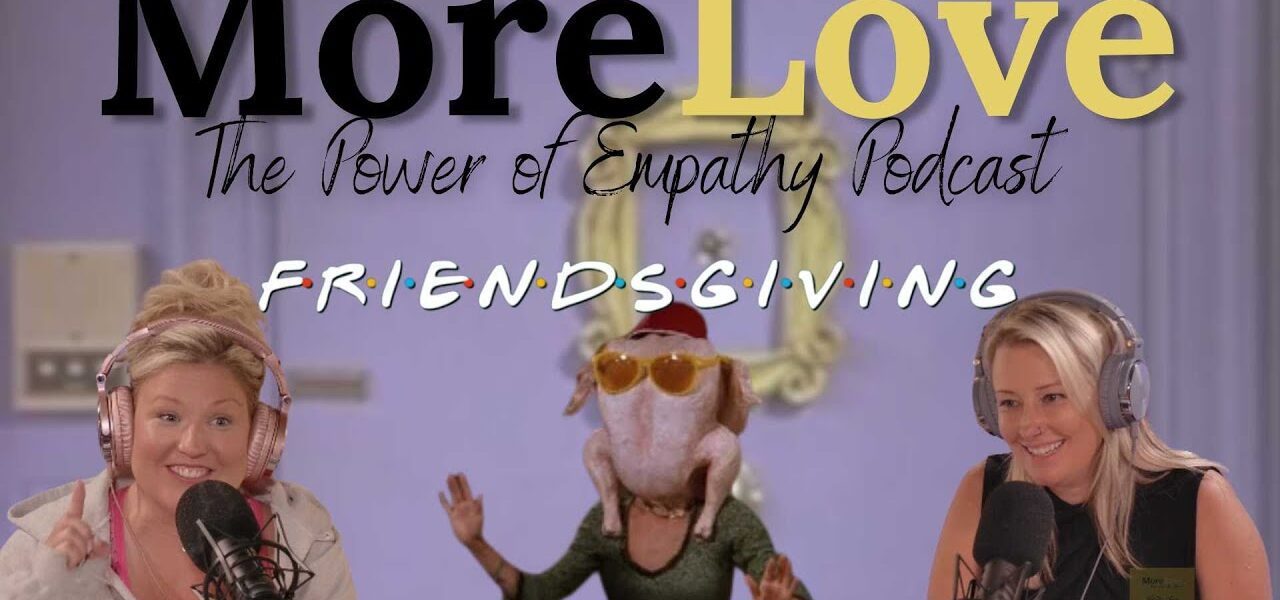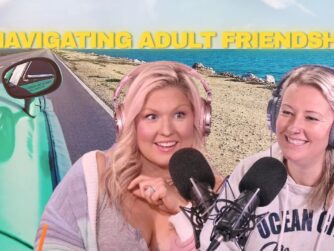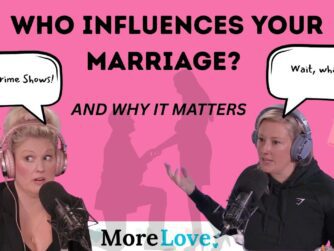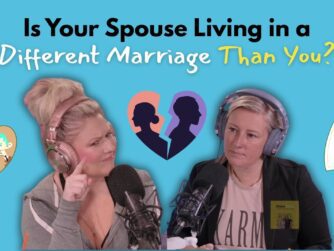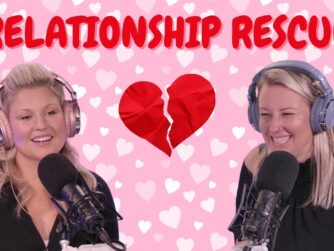💌 Curious about Erin and Rebecca’s incredible friendship journey? Explore their full timeline and learn more about their story at themorelovepodcast.com/co-hosts.
Speaker B [00:00:28]: Hey, bestie.
Speaker A [00:00:29]: Hi, love.
Speaker B [00:00:30]: What are you doing?
Speaker A [00:00:31]: Oh, just getting ready to host a podcast.
Speaker B [00:00:34]: A podcast about what?
Speaker A [00:00:36]: Life. Our life as best friends who are more like sisters.
Speaker B [00:00:40]: Ah, yay. I love us. And I can’t wait to share our.
Speaker A [00:00:43]: Stories with the world, especially the ones that involve us pushing each other. Right. To be our most authentic selves.
Speaker B [00:00:50]: Oh, man. Okay.
Speaker A [00:00:56]: So what happened was she takes these vases. I do think it’s two of them. With the. With the bamboo in. Yeah.
Speaker B [00:01:05]: This was back now, this is 2008, when this was, like, a big deal. And she’s.
Speaker A [00:01:09]: She’s moving these presents aside and holds it up and just looks at me like this. Just glares at me with these. I said, what the is that? She goes, it’s my bamboo. I said, why do you have bamboo stocks? She said, it was a gift. I said, was there something else with it or was like that?
Speaker B [00:01:38]: That was it, the gift.
Speaker A [00:01:39]: And she said, it’s. That’s the gift. And I said, from where?
Speaker B [00:01:43]: I think.
Speaker A [00:01:43]: And the sticker on the bottom of.
Speaker B [00:01:46]: It says ikea, but I never heard of ikea. And you had.
Speaker A [00:01:50]: Yes. I said, I’ve always wanted to go to ikea, so let’s bring that back. Right. And then you can turn that in and you can get yourself a dish or, like, a cake.
Speaker B [00:01:59]: I think we went on the aol.
Speaker A [00:02:01]: Yeah.
Speaker B [00:02:02]: And looked up.
Speaker A [00:02:02]: Absolutely.
Speaker B [00:02:03]: And looked up what IKEA was. And then that’s when I realized we don’t have international gps. So I used my wedding money to buy the garbage movie.
Speaker A [00:02:11]: Right.
Speaker B [00:02:12]: Splurge into before the international package with.
Speaker A [00:02:16]: The bamboo were what ultimately got us to go to IKEA for the first time. So we were really, really thankful for that. And our goal was we were just gonna go in and we were gonna say, we’re gonna get the money for this on a gift card. And then we’re gonna go shopping. And we’re gonna go shopping.
Speaker B [00:02:30]: No, we’re gonna go at a shopping spree.
Speaker A [00:02:31]: Oh, yeah, absolutely. Because IKEA is fancy.
Speaker B [00:02:34]: Yes, IKEA is fancy, but also a.
Speaker A [00:02:37]: Little bit, like, cheap because the conversion rate.
Speaker B [00:02:40]: Oh, yeah. We didn’t know what Ike.
Speaker A [00:02:43]: More for our money. Right.
Speaker B [00:02:45]: We thought IKEA was like this.
Speaker A [00:02:46]: But what I needed to Clarify. There was what. What Rebecca said. Aaron was like, well, you know, in and see what else is there. That is not what Aaron said. Aaron’s like, what the. Is that right? Right.
Speaker B [00:02:58]: So we get in the car, we go through the Tim Hortons, we get our cider with our butter, we discover Cockram Road. And then as soon as we are crossing the border, we’re waiting, waiting, waiting, waiting, waiting.
Speaker A [00:03:10]: Please turn, please turn, please turn. We don’t know what to do. We’re too far in at this point. And then it showed up and we celebrated. It was 1989.
Speaker B [00:03:18]: That’s right. Then we decided every time we see a Canadian flag.
Speaker A [00:03:21]: Yeah.
Speaker B [00:03:22]: We were going to say, oh, Canada. Every time.
Speaker A [00:03:26]: Every time we saw the Canadian flag.
Speaker B [00:03:28]: So we’re driving, driving.
Speaker A [00:03:29]: I think we even saluted.
Speaker B [00:03:31]: I’m sure we did. I’m sure we saluted and we had to do it no matter what. No matter what. And if somebody started with the oh.
Speaker A [00:03:39]: You just jump because they saw the flag before you did. Someone was in the middle of a story, didn’t matter. Boom.
Speaker B [00:03:44]: O Canada.
Speaker A [00:03:46]: Yeah, that was that.
Speaker B [00:03:48]: So I’m pretty sure we did it as we’re driving through, getting carted or.
Speaker A [00:03:52]: Whatever when you go through customs.
Speaker B [00:03:54]: And then they didn’t like that. No, they didn’t like that at all.
Speaker A [00:03:57]: I’m.
Speaker B [00:03:57]: Excuse me, sir. We have to do this.
Speaker A [00:03:59]: No, no, they. They are not there for any of that.
Speaker B [00:04:03]: Correct, Correct. So we’re growing through. The garment’s working. Thank freaking God. Saluting, having a. Having a great time. We finally get to the destination.
Speaker A [00:04:10]: Yeah.
Speaker B [00:04:11]: We get there. We’re so excited.
Speaker A [00:04:12]: Can’t wait.
Speaker B [00:04:13]: Now I’m.
Speaker A [00:04:13]: Here we go.
Speaker B [00:04:14]: Nervous Aaron.
Speaker A [00:04:16]: This is the.
Speaker B [00:04:16]: Aaron’s not nervous about certain things. I can’t wait.
Speaker A [00:04:19]: Turn this in. Right. Get my gift card. We decide right?
Speaker B [00:04:22]: We decide right. We pull in huge Canada flag. Singing it on the way in. Okay. Get in. And I say, what’s the plan? She’s like, just follow me. She goes up to the lady. Was it a lady or a man?
Speaker A [00:04:36]: It was a. It was a man.
Speaker B [00:04:37]: A man. Okay. Got up there and she’s like, we just got married. We just. We just got married. And we got this as a gift. And we would like to exchange this. Then what happens?
Speaker A [00:04:47]: And it’s okay if you just want to give us a gift card or whatever for. For this, but we just wanted to turn this in because we’re going to get something else. She’s like, oh, not a problem. She picks up. Does she know him? Okay. He picks up the bottom, scans it, picks up the other bottom, scans it. You gotta swallow. You gotta swallow before I say this. Expert. Yeah. I’m waiting at this moment.
Speaker B [00:05:18]: I’m looking around. I’m looking around because I’m in awe.
Speaker A [00:05:20]: We’re in a minimum. Minimum. We’re getting back. Minimum.
Speaker B [00:05:24]: 50 bucks. 50 bucks minimum. Oh, but we have two bucks.
Speaker A [00:05:27]: We have two.
Speaker B [00:05:28]: Because this, this is V. 50 bucks.
Speaker A [00:05:31]: This is a V. Minimum 50 bucks. I’m there like a kid at an ice cream store. We’re so excited.
Speaker B [00:05:37]: We are going on a spree.
Speaker A [00:05:39]: Cannot wait. Oh, next thing you know, that’s the cash register opening. Seven bucks. She, he, he goes into the little point, the coin drawer area. No. Picks something up and holds it out for me.
Speaker B [00:06:01]: Right?
Speaker A [00:06:01]: Now I put my hand out because I’m a little confused at this moment about what’s happening, right? And he puts one quarter in my hand.
Speaker B [00:06:11]: That’s 25 cents.
Speaker A [00:06:16]: And I. I’m looking at him. My hand is outreached, waiting for the dollar bills.
Speaker B [00:06:22]: We’re waiting. We thought we got the change.
Speaker A [00:06:23]: I’m looking at him, he’s handing me the quarter. I’m confused about why. This is the beginning and the end of this transaction. And he says, there’s your refund.
Speaker B [00:06:38]: It’s 25 cents.
Speaker A [00:06:40]: I said, sir, this is 25 cents. He said, that’s correct. I believe usually they’re 25 cents a piece, but right now they’re buy one, get one. And because you don’t have your receipt, see, I can only give you what they’re worth right now. I look over at Rebecca and she has her legs crossed in pissing position.
Speaker C [00:07:18]: Don’t piss on my seat.
Speaker B [00:07:20]: Is.
Speaker A [00:07:21]: She is howling. She is.
Speaker B [00:07:23]: I can’t.
Speaker A [00:07:24]: I’m holding this corner up.
Speaker B [00:07:26]: I can’t.
Speaker A [00:07:27]: And I am like, what is this? Is. Is he serious? I can’t. This man, this man, he’s just an island doing his job.
Speaker B [00:07:36]: And I turn to her and I see a Canadian flag. And all I say is, oh, Canada. I can’t. I can’t. We thought this thing was. We were shot a shopping spree.
Speaker A [00:08:03]: Knew. I said, you want this or can I keep it?
Speaker B [00:08:06]: Can I keep this?
Speaker A [00:08:07]: You want it? Can I freaking keep this?
Speaker B [00:08:10]: I can.
Speaker A [00:08:11]: Time to go home. We don’t have any cash to spend. Oh, my.
Speaker B [00:08:15]: Good thing I bought that newbie like you.
Speaker A [00:08:18]: Not good thing you spent the extra on the Canadian map.
Speaker C [00:08:21]: So someone gave you a 50 cent wedding present.
Speaker A [00:08:24]: Correct.
Speaker C [00:08:25]: I gotta know who this is.
Speaker A [00:08:27]: Correct.
Speaker B [00:08:27]: We’ll tell you after.
Speaker A [00:08:31]: Correct. And I. You know what? And I’m so thankful that this person did because we would never have one of the best stories.
Speaker B [00:08:38]: That was such a great event. Not only that, but then we decided to make it a trip. Like it wasn’t at the time we saw Ugly Betty. Yeah. We.
Speaker A [00:08:47]: That was the time you stood in front of the top tallest man on the job. Yeah.
Speaker B [00:08:50]: Like there was. There was a lot. We went to the zoo.
Speaker A [00:08:53]: That was the time that we were in the hotel room. Hotel room. And you said, if we’re going to rent a movie, we really got to watch it. And I said, instead of what? Make it out all night? Like, what did you think we were going to do?
Speaker B [00:09:04]: Right. And that was. I think that was one of the first times we did a sleepover.
Speaker A [00:09:07]: Yeah.
Speaker B [00:09:08]: And I talk so much.
Speaker A [00:09:10]: You’re like trying to. I was like, trying. This is. That was legit. Probably one of the first times we ever slept in the same room. And I got to a delirious point where she just would not stop talking. And then I don’t know what happened next, but I just remember that she’s like. So last night I was in the midst of talking to you about something. Asleep.
Speaker B [00:09:31]: That’s why I said we have to watch it. Because I knew if we weren’t talking, there was a chance we’d fall asleep. And then it’d be pissed that we.
Speaker A [00:09:37]: I would fall asleep. That’s what you were worried about. You were wide awake. It was like you had just had a cappuccino or something five minutes before.
Speaker B [00:09:43]: I don’t sleep. Is. Not only are you building a home, trying to close out your old home, move into this new home, but now you’re bringing your parents in.
Speaker A [00:09:52]: Yep.
Speaker B [00:09:52]: So your parents are building this too.
Speaker A [00:09:53]: Who lived two hours away, 70 years old. Relocating from the place that my father has lived.
Speaker B [00:10:00]: Right.
Speaker A [00:10:01]: His entire life.
Speaker B [00:10:03]: Right. So now you’re. Man. There’s just significant things. And then couple that with building a home. Anybody who’s built a home know it’s not pleasurable. And then two years after, it’s still not pleasurable. So couple all of that together. So you’re. You’re managing that.
Speaker A [00:10:19]: Yes. And my business. Growing is growing.
Speaker B [00:10:22]: Your child’s experiencing some things that are showing up more rampantly than you’re used to. You’re trying to navigate that. There’s just a lot of things. It’s always this circle of chaos. Yet you exude calmness.
Speaker A [00:10:38]: And even here. Right. Bring it on.
Speaker B [00:10:41]: But it’s not true.
Speaker A [00:10:42]: Yeah. Yeah. Or at least I’ve convinced myself, you know. Okay, well, grin and bear it.
Speaker B [00:10:47]: Right?
Speaker A [00:10:47]: Make it happen. Right, Right. So I had written that down here. Diagnoses. That’s how I was referring sweet little Carter. Right? Like we were trying to be like, what the heck is going on here? This is so crazy. Yeah. But between family life, personal life, Carter learning about different things that were going on for him. Building this house, selling my other house, we ran into some major real. Real Two weeks before we were supposed to move in. That was the craziest. I cannot.
Speaker B [00:11:15]: You moved in with me.
Speaker A [00:11:16]: That I. Yeah, I moved with you.
Speaker B [00:11:18]: You had to move in with me.
Speaker A [00:11:19]: And yeah, at one point, we thought that we were going to have to walk away from the house, have no place to live. My parents had literally sold my childhood home.
Speaker B [00:11:29]: Right.
Speaker A [00:11:30]: And talk about, like, wait, right? I’m like, okay, let’s. We were looking.
Speaker B [00:11:36]: We were looking into long term rentals. We were. Look. I mean, we were doing all the.
Speaker A [00:11:39]: Things long term rentals during COVID couldn’t find. And if you did find, it was $4,000 for a one bedroom.
Speaker B [00:11:45]: Right. And I live in a tiny ass home. And I’m like, come in. Yep, come in.
Speaker A [00:11:49]: And so you remember this? Carter and I came to live with you. We slept together on the couch downstairs. Mark, I don’t even have a spare bedroom. No, no. Mark took the cats, went to Aunt Sherry’s house, lived there for two weeks, and the cats lived there with Aunt Sherry for two weeks. They lived it up. It was like a bachelor life between the two of them. And I’m single mom, living on your couch with Carter, going back and forth between, like, daycare and this event and that event or whatever it was.
Speaker B [00:12:17]: And part of the reason you chose to live with me is because daycare was next door. Yeah, your daycare was next door, too.
Speaker A [00:12:23]: That was number 400 on the list where I live. One was. That was my dream because I took care of you.
Speaker B [00:12:30]: I cooked for you every day.
Speaker A [00:12:31]: Remember when you made me my mocha drink in the morning? Should I take a sip of. I’m sitting on Bertha Big Bertha. And I take a sip of it and I’m like, damn, you make the best mocha iced coffee. And you said, that’s because I put hot fudge in it. And you take out this hot fudge, it’s got like, no joke, four gobbing scoops of hot fudge in it. Yeah. I’m like, of course that tastes great. That thing is 4,000 calories, but it’s delicious.
Speaker B [00:12:59]: Yeah, but you Needed it. Because you were not in a good place.
Speaker A [00:13:02]: I know, I know. You move into the house. Right. That still had its own issues with it. Right. So are we hearing the build up here of ridiculousness?
Speaker B [00:13:12]: Yeah.
Speaker A [00:13:12]: I then decide. Because why not?
Speaker B [00:13:14]: Right.
Speaker A [00:13:15]: We’re leaving higher.
Speaker B [00:13:16]: Right.
Speaker A [00:13:16]: We’re leaving here. I’m gonna do my job. I’m gonna do my job, my concern center job, and do that full time. It’s growing. This is great. And bring Rebecca into that, you know?
Speaker B [00:13:28]: But wait, I need to say, just because we have to. Every time you and I have a career change, we have a tradition.
Speaker A [00:13:35]: Yes.
Speaker B [00:13:36]: Every time you want to tell them or me.
Speaker A [00:13:38]: Yeah.
Speaker B [00:13:39]: So where do we go back Back in the day? If you read our timeline on our website, it is quite funny. And someday maybe we’ll talk. But back in the day, when I originally decided to jump ship from higher education, we always joked about how we were going to go to the strip club.
Speaker A [00:13:54]: Always just us.
Speaker B [00:13:55]: Just us for lunch.
Speaker A [00:13:56]: Yeah.
Speaker B [00:13:57]: We’re going to go to the strip club for lunch.
Speaker A [00:13:58]: We’re going to meet. Chicken wrap.
Speaker B [00:13:59]: Right. At the strip club. And I don’t know why. I think it’s because it was the halfway point between both of our jobs. You worked at the one campus down the street. I worked at the other campus. I’m like, let’s meet at the strip club. It was like a running joke. Well, the day I left.
Speaker A [00:14:12]: Yep. We. Which was like 10 years ago. Wow. Yeah.
Speaker B [00:14:15]: You said.
Speaker A [00:14:16]: You said, I’ll meet you at the Tally Hall. I’ll meet you at the. Okay, I’ll meet you there.
Speaker B [00:14:19]: So we drive to the Tally Ho.
Speaker A [00:14:21]: We get out of the car.
Speaker B [00:14:22]: We’re all ready.
Speaker A [00:14:22]: And we’re ready.
Speaker B [00:14:23]: We’re ready.
Speaker A [00:14:24]: We’re going in. We look at each other.
Speaker B [00:14:26]: I’m like, we can’t do it.
Speaker A [00:14:26]: I can’t go in.
Speaker B [00:14:27]: I can’t do it.
Speaker A [00:14:28]: I can’t bring myself to go in. The minute that some boob flies at my face, I’m losing it. I can’t do it. I can’t do it. So we.
Speaker B [00:14:35]: What did we do? We took a picture with the Tally.
Speaker A [00:14:37]: Ho Chelsea with a Tally Ho in the background. And we’re like, tally ho. And then we got the car and we left. I think we went to Hobby lobby. Right.
Speaker B [00:14:47]: So that was my leaving Higher Ed. So of course.
Speaker A [00:14:51]: Oh, yeah. So here it is. I leave Higher Ed. Right. Which took me at least another seven years after you left because we all know it takes me longer to agree to things.
Speaker B [00:14:59]: So we meet at the Town.
Speaker A [00:15:00]: Where do we go? Here’s my favorite part about that. We go to the tally.
Speaker B [00:15:04]: I know.
Speaker A [00:15:05]: And we’re like, okay, ready? Are you ready to go in? It’s lunchtime. Okay, we got this, right? And then we get out of the car, and we’re like, still can’t do that. Still can’t do it, Right? So we take the picture. Fine, fine, fine, fine. Just get the selfie. So we take the picture, and then we both are like this.
Speaker B [00:15:19]: We don’t look so good.
Speaker A [00:15:20]: What the hell happened to us? I think you said, compare it to the last one. Compare it to the one from, like, seven years ago. So we take it out. We look at both of them. I’m like, what the hell happened to us?
Speaker B [00:15:31]: We look like we’re like, number one.
Speaker A [00:15:33]: This coat I’m wearing is burned because I look like an old woman. And I’m like, look at all the wrinkles on your face. You’re like, this is not okay.
Speaker B [00:15:42]: I know.
Speaker A [00:15:43]: So I think, no joke, we took at least 27 pictures. Selfies. Until we got one. And I’m like. You’re like, lift the camera up higher. And then I’m like, get a filter on that. Right? So, like, it’s not good. So we’ll put a picture up of.
Speaker B [00:15:56]: 10 years ago and then the recent one.
Speaker A [00:15:59]: Yeah, yeah, this was not good. But let’s just say we still can’t.
Speaker B [00:16:03]: Go and see the batch.
Speaker A [00:16:04]: Yeah, now we really can’t go.
Speaker B [00:16:05]: Oh, no, not a chance. We’re not taking any pictures. You can’t leave. Can’t leave your job.
Speaker A [00:16:09]: We’re not going in the Tally Ho now. We’re the oldest bitties in there. And this time we had a chance. Chance 10 years ago.
Speaker B [00:16:16]: Well, we might be going back to the tally Ho.
Speaker A [00:16:19]: So what are you.
Speaker B [00:16:21]: What are you doing after this podcast?
Speaker A [00:16:24]: Scott, meet us there. Scott. Scott, bring your camera.
Speaker B [00:16:28]: This time we’re going in.
Speaker A [00:16:30]: Scott, we got some video footage for you. And highly critical, discerning, and opinionated. Be held at the same place as empathy.
Speaker B [00:16:44]: Well, yeah, because it’s connected. How? Well, take the dad’s dance for an example. Your empathy is. Oh, I really appreciate that you went out on a limb and wanted to do this for your kid. However, maybe pick something else because this was not good. Yeah, that’s totally fine in my opinion.
Speaker A [00:17:04]: Okay. And what about you, Scott? You think they’re related, but could be.
Speaker C [00:17:09]: Just the autism part. I mean, could be the neurodivergent part, because you can’t not do those things. But you have an opinion of how things should be.
Speaker A [00:17:20]: Yeah, always.
Speaker C [00:17:21]: And that includes anything having to do with empathy.
Speaker A [00:17:27]: True.
Speaker C [00:17:28]: So it’s kind of. You can’t avoid it. You have to take all of it together.
Speaker A [00:17:32]: But what I think is interesting is if I was highly critical, discerning, and opinionated on things, to just be highly opinionated, critical and discerning, that feels different to me than the reason that I’m having an opinion on whatever it is, is because I so greatly want you to either be the best version of yourself. Right. Or I don’t want you to make a fool out of yourself.
Speaker B [00:18:05]: Ding, ding, ding, ding. That’s why I am opinionated, because I’m.
Speaker A [00:18:09]: Like, you don’t feel the same way.
Speaker B [00:18:11]: No, I do. I’m like, I have so much empathy for you that I don’t want you to be embarrassed.
Speaker A [00:18:17]: Yeah.
Speaker B [00:18:18]: I don’t want you to come across as not the best version of yourself. Don’t make that choice. But I can’t. I’m not. I’m not comfortable communicating that.
Speaker A [00:18:28]: Mm.
Speaker B [00:18:29]: So I’m rather just like, that ain’t it. You know what I mean? Yeah.
Speaker A [00:18:33]: But it. But it’s coming from a place of care and concern. The use of performance evaluations is the same, you hear me say, all the time. I am going to be critical and opinionated and have an incredibly strong thought on what you’re doing, how you’re doing it, and how you can be better. Because I think that’s the kindest thing I possibly could be. I can’t be over here pretending and letting you act a fool.
Speaker B [00:18:57]: Right.
Speaker A [00:18:58]: Or let you think that whatever work you’re pulling is a 10.0 right. When it’s a 6.0.
Speaker B [00:19:04]: Right.
Speaker A [00:19:04]: Because someone who’s less kind in the future is going to bring that up to you, are going to fire you.
Speaker B [00:19:09]: Yeah.
Speaker A [00:19:09]: And I feel an innate sense of responsibility to bring that. Bring that up.
Speaker B [00:19:15]: Yeah.
Speaker A [00:19:16]: The example of Russ with the driving situation. In my mind, I wasn’t thinking of that as being critical. I. Or like, opinionated. I was thinking of that as. I see you right.
Speaker B [00:19:29]: Yeah.
Speaker A [00:19:29]: In the small, in the smallest little driving capacity. I see you. Right. But I. I don’t think that that’s how people typically view opinions. Thoughts, criticisms, whatever. And to be fair, I don’t always think that people are coming from the same place. So I don’t know if this is an Arrow Aaron thing, if this is a neurodivergent thing, if this is whatever. But I have been watching all of the reels that you Send me on Instagram. I know from the neurodivergent, I can’t help myself, which I absolutely love. And there is a very common theme there, that we are not doing these things out of trying to be an asshole or at all. What we also get is you think you’re better than everyone else. You think that you’re. You know, your way is the right way. You. And we may come across like that because when we do say things, it’s often with conviction because we’ve given so much thought to it before it comes out of our mouth. Right. That. That sense of confidence can often be misrepresented as arrogance and can also be seen as the opposite of empathy. And I think that’s at least very confusing to me because I think it’s the kindest thing I can do for you, is to share it.
Speaker B [00:20:41]: The only thing I can think of right off the bat is, you know, the golden rule. If you don’t have anything nice to say, don’t say anything at all. So we’re. We’re taught as a very. At a very young age to not criticize and to definitely not say it.
Speaker A [00:21:00]: Mm.
Speaker B [00:21:02]: You know, so I think that, again, context, right? Like when you’re. When you’re telling little children these kinds of things, it’s very confusing. It’s very confusing because you. You teach this fundamental concept, and then that is where. That’s your baseline. So it’s like, well, I can’t be critical of that because in theory, it’s fine. It’s just not fine for me. Or it’s not fine in this context, but it is fine. But I’m not going to say anything.
Speaker A [00:21:34]: Because now I have gotten better about not providing unsolicited advice if people aren’t ready to hear that. So I am trying very hard to do a better job of saying, what is it that you would need from me in this moment? You know, are you interested in. Do you want a hug? Do you want me to just listen? Do you want. You know, because I. Because I think my natural go to is to go to. I’m going to fix this for you, and I’m going to let you know. And I have the answer for you. And here’s the answer. And I’ve served it up on a. On a silver platter, but that has often led to me being incredibly disappointed and angry and sad and. Because now you’re still suffering even though I served this up on a silver platter for you.
Speaker B [00:22:15]: Right?
Speaker A [00:22:15]: And then I’m over here, just left holding it Because I’m like, I gave you the.
Speaker B [00:22:20]: Yeah.
Speaker A [00:22:21]: Right.
Speaker B [00:22:21]: And nine times out of 10, the people don’t want the answer. Right. Because deep down they know the answer, but they don’t want it. They want sympathy, they want commiserate, they want validation. They want. Yes, that’s hard for me and you. Which is why I don’t have a lot of close friends.
Speaker A [00:22:38]: So you just don’t engage. You don’t engage. And then I have to constantly be asking how you want me to engage because I cannot sit in a space where you are struggling, struggling, struggling, struggling, struggling.
Speaker B [00:22:51]: I know.
Speaker A [00:22:52]: And then I step in to try and be helpful to you and then you continue to do the same thing over and over again and now want to keep coming back for what?
Speaker B [00:23:03]: Commiserie? Validation.
Speaker A [00:23:05]: Right. And all the things that. Helpless complainer.
Speaker B [00:23:08]: Yeah. Especially when you feel that way.
Speaker A [00:23:11]: Right.
Speaker B [00:23:11]: That’s hard. That’s really hard.
Speaker A [00:23:13]: Or maybe you’re not as far along in your journey or whatever. But my point of all of this being, I think it’s so interesting when, when we think of. I remember with the mystic autistic that we had on, I’m like, how can you be autistic and also mythical? Those two things don’t make sense to me in the same place. Right. Because the mythical part is in my mind, absence of some logic and is letting the universe play its role. And autism. Autism. The autism to me that she was talking about is much more rule bound and truth seeking and specific. Right. And she was saying, no, those two things aren’t opposite for me.
Speaker B [00:23:55]: I loved that.
Speaker A [00:23:56]: Me too. Isn’t empathy amazing?
Speaker B [00:23:59]: Well, we’re amazing. I don’t know about all that sympathy stuff.
Speaker A [00:24:03]: That’s fine. I accept you wherever you are. Oh, God, I love you.
Speaker B [00:24:09]: I love you too.
Speaker A [00:24:10]: And if you love us, please like and subscribe to more Love the Power of Empathy podcast. Wherever you get your podcasts.
Speaker B [00:24:19]: See you next time.

